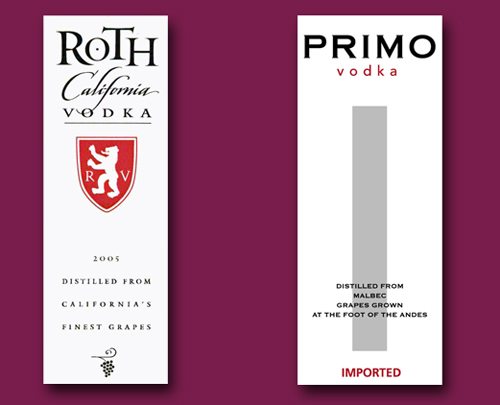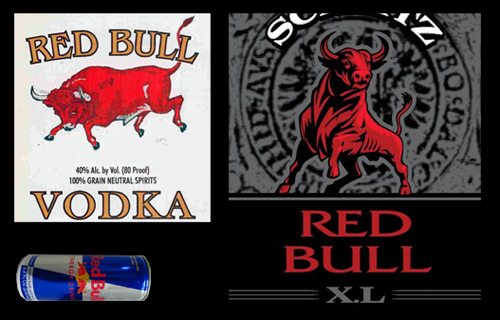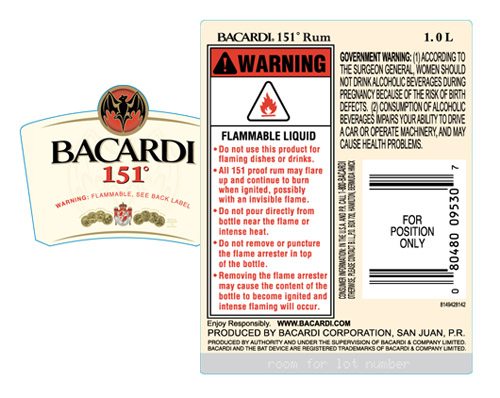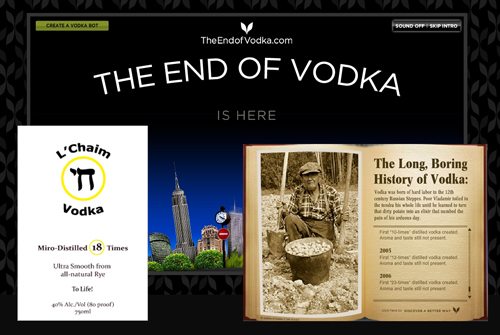L’Chaim Vodka is distilled no less than 18 times. In an excellent website (www.theendofvodka.com), VeeV Acai Liqueur pokes fun at the vodkas distilled 3, 5, 23, 570 times. The site is funny, pretty, and makes a good point. It tends to suggest that after the first couple of distillations, and after pushing the spirit past 190 proof, it’s a fairly pointless exercise to distill it more. Virtuoso Distillers, of Mishawaka, Indiana, is undaunted. In box 19 of the L’Chaim approval, Steven Ross patiently explains that the vodka is distilled 18 times. TTB frequently asks for such a confirmation, when the label sets forth the number of distillations or filtrations. This is odd because the label already claims it under penalty of perjury, the certification doesn’t seem to make it any more likely to be true, and it would seem to be a minor point in any event (for the reasons suggested by VeeV). Mr. Ross has a lot more going on, on this label. He further explains that L’Chaim (or, “To Life”) is similar to “cheers,” carefully avoiding any suggestion that it’s about health. This is not a small matter because, prior to this approval, the term was rarely used in a prominent way on US alcohol beverage labels. Mr. Ross explains that the letters...
Continue Reading Leave a Commentvodka
Vodka with Vintage, Varietal, Apellation

TTB does not usually allow vintage-, varietal- or appellation-type claims on distilled spirits labels. The rationale is that these concepts tend to be more appropriate for wine. But here are a couple of notable exceptions. Roth Vodka displays “California” in much the manner of an appellation. This vodka also happens to be distilled from grapes, and has something close to a vintage date on the front label. The latter apparently went too far, and TTB directed Roth to remove the date. In some ways, the Primo Vodka label goes a bit further. It mentions a specific grape type, along with the source of those grapes. One side tends to argue that these claims are truthful and verifiable. TTB tends to argue that characteristics such as vintage, varietal and appellation are subtle to begin with; distillation (let alone distillation to the point of neutrality) tends to obliterate such characteristics; and it’s misleading to suggest otherwise. Do consumers need this protection?
Continue Reading Leave a CommentRed Bull Vodka and Beer

It’s a wonder that Red Bull (of Austria) has not yet come out with with an alcohol beverage. It would be likely to be a smash, in that the product is so very popular as a mixer. Perhaps things are going so well with the energy drink that there is no need to mess with it. But more likely, these two products beat the Austrians to the punch. Miller Brewing Company has approvals for Red Bull Malt Liquor going back at least as far as the early 1980s. Likewise, Majestic Distilling has approvals for Red Bull Vodka going back to 1990 or so. This Dog Style Vodka is one of the few TTB products to make explicit reference to the famous energy drink.
Continue Reading Leave a CommentTags: business strategy, caffeine/secondary effects, famous, trademarks-beverage
Highly Flammable Spirits

Bacardi revamped its 151 proof rum labels in May. At almost 76% alcohol, this rum is of course flammable as well as potent. The labeling includes not less than eight warnings to this effect. The bottle also includes a flame arrester. One of the main warnings says, “Do not use this product for flaming dishes or drinks.” It’s a little bit like a Maserati with a warning that you should not exceed 55 mph. We kind of thought flaming drinks were one of the main purposes for this product. If not, we went in search of the more conservative uses for this product. We found very little, with no trace of this product on Bacardi’s US website. This group seems to have no idea what to do with it either. At an even higher concentration of alcohol is Golden Grain Grain Alcohol. It is 95% alcohol and is also plastered with warnings throughout the front, back and neck labels. This is a rare example of TTB allowing warnings other than the specific health warning mandated by Congress (see this for an example of a warning not allowed). It’s hard to say the extra warnings are not warranted here.
Continue Reading Leave a CommentTags: business strategy, legally interesting/controversial, policy
New York Apples

Maybe N. Bergman or L. Fogelman can explain why there are so many distilled spirits plants in New York, all of a sudden. Here are three, and all are distilling vodka from apples (rather than the much more common and less expensive distillation from grain). Tuthilltown Spirits makes Heart of the Hudson Vodka (above). It is distilled from 100% New York apples. Eighty miles up the Hudson River, Harvest Spirits makes Core Vodka. They purport to distill only from Hudson Valley apples, in small batches. Third, there is Beak & Skiff Vodka, also distilled from apples, over near Syracuse. Larrie Laird (the dean of distilling apples in the US) once explained that it is immensely expensive to produce high-proof spirits from apples or any other fruit. It can take well over 25 pounds of apples to make one bottle.
Continue Reading Leave a CommentTags: ingredients
Diamonds, Gold & Vodka: What Recession?

One is filtered through diamonds and the other has gold flakes in the bottle. Double Cross Vodka is made in the Slovak Republic, where it is “filtered with diamond dust.” The small red strip label says so. Thanks to The Intoxicologist and Emily Haile for bringing this to our attention. Luxist explains:
The seven-times-distilled spirit uses only 100 percent organic, estate-grown winter wheat and mountain spring water drawn from aquifers located 200-feet below ground level. Double Cross’ diamond dust filtration system is said to provide unprecedented filtration capability because of the “unique shape and sub-micron size of the diamond dust particles.”
Rather than filter through the costly substance and leave it at the distillery, Gold Flakes Vodka puts the 24 karat gold right in each bottle. Luxist says it will retail for about $60 per bottle.
Continue Reading Leave a CommentTags: business strategy, ingredients, processing


